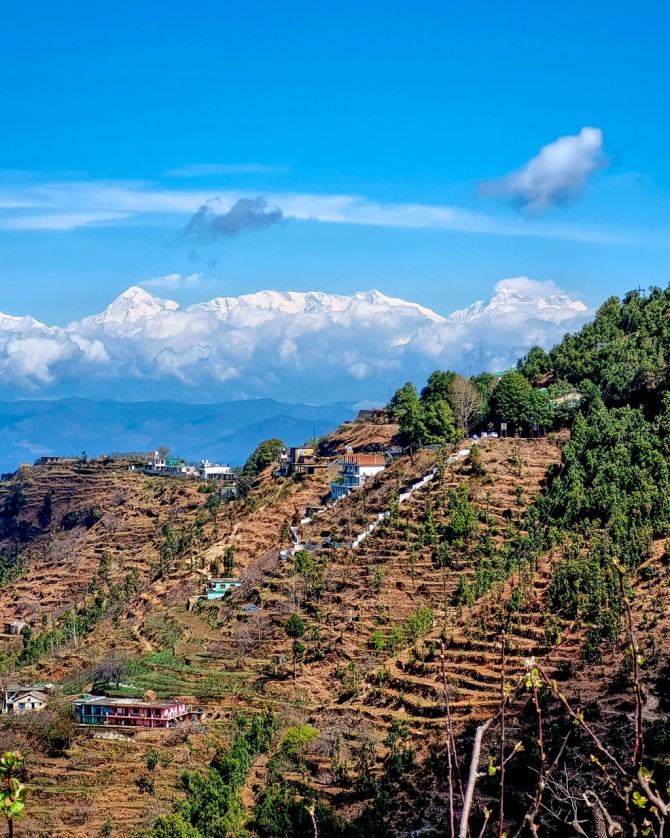
Ann Fraser, a consultant on the grant and retired biology professor from Kalamazoo College, hand pollinates an apple flower in Uttarkhand region, India.
NYS-Himalaya pollinator project receives $1.8M grant
By Krishna Ramanujan, Cornell Chronicle
A Cornell-led team has received a three-year, $1.8 million grant from the National Science Foundation to study how wild pollinators, humans and landscapes interact and how people might act collectively to promote pollinator health.
The project will compare smallholder apple farms in the Western Himalayas and in Central New York through the lens of social, biological, environmental and landscape dynamics, and their impacts on wild pollinator health.
Ultimately, the project aims to examine such dynamics within and around these apple farming systems to understand how new “institutions” – a term for the formal and informal rules that people follow – might develop to promote a sustainable shared resource, in this case ecosystem services that pollinators provide and that benefit everyone.
“We were thinking about the disconnect between the narrative around pollinators as a common pool resource that we all are so reliant on, and the fact that there really isn’t any evidence that they’re actively being managed collectively,” said Ginger Allington, principal investigator on the grant and assistant professor of natural resources and the environment in the College of Agriculture and Life Sciences. Some examples of collective management include community fisheries, use of grazing grounds by herders and community forests in India, where trees are under pressure for use as fuel for cooking.
The study areas include the Nainital District of Uttarakhand in Northern India and the Finger Lakes Region of New York. In India, researchers plan to study a total of 60 apple orchards, each containing at least 50 trees, at elevations ranging from 1,500 to 2,400 meters above sea level. This is an optimal altitude for apple growers in India but also where farmers – and wild pollinators – are especially vulnerable to climate change. Farmers there have experienced production declines and preliminary experiments suggest that apples there are indeed not getting pollinated enough.
New York, on the other hand, is the second-largest apple-producing state in the U.S. U-pick apple orchards, which are much smaller than commercial operations, provide sites for comparison with India’s smallholder farmers. The project will focus on 30 farms with orchards between 1 and 10 hectares, within Wayne, Seneca and Tompkins counties.
Smallholder farmers in both Uttarakhand and the Finger Lakes are experiencing apple production declines, in part due to limited pollination. At the same time, the two regions differ biophysically and socially, in terms of existing rules governing how people interact with landscapes and farming practices.
The project leaders believe the two study areas will provide a breadth of information with regard to three research questions they intend to answer over the span of the grant. The questions will try and uncover how the landscape, and habitats around farms and their effects, interact with farms and farmer practices to influence the fate of wild pollinators, and how social, institutional and environmental landscapes can set the stage for farmers to engage in collective action.
The work will help discern the spatial scale at which collective action might be feasible and beneficial for pollinator communities and the agricultural systems they serve, according to project leaders.
Project partners include the Sustainable Farming and Food Systems Program at Tompkins Cortland Community College (TC3). The grant will fund summer internships for four TC3 students to participate in fieldwork and research.
Co-PIs include Monique Rivera, assistant professor of entomology at Cornell AgriTech; Aman Luthra, assistant professor of geography at George Washington University; Vishal Singh, executive director of the Center for Ecology Research and Development in Uttarakhand; and Matt Williamson, a conservation scientist at Boise State University.
The grant is part of the NSF’s Dynamics of Integrated Socio-environmental Systems (DISES) program.
Media Contact
Get Cornell news delivered right to your inbox.
Subscribe



